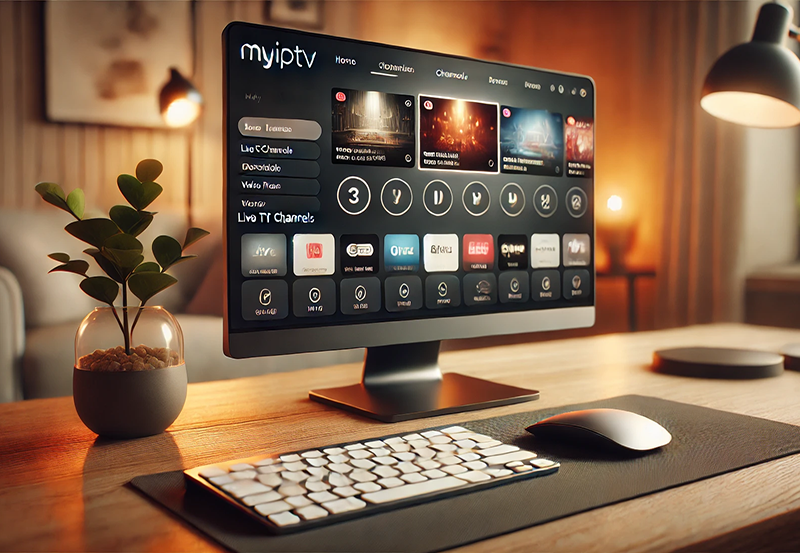The digital streaming landscape has dramatically evolved, offering an array of IPTV solutions specifically designed for Linux users. Among these, Kodi stands as a notable contender, alongside several other alternatives. In this article, we’ll explore how Kodi measures against its competitors in the IPTV space, focusing on the features, user experience, and how it can amplify your IPTV enjoyment effortlessly.
Understanding the Basics of IPTV and Linux Compatibility
Internet Protocol Television (IPTV) has revolutionized the way we consume media, moving away from traditional broadcasting methods to internet-based streaming. On Linux, a variety of IPTV players offer users the ability to stream top IPTV subscriptions directly from their devices. However, choosing the right software can be daunting given the plethora of options available.
Linux, known for its stability and open-source nature, supports numerous IPTV players, including Kodi. Each application comes with its own set of strengths and unique attributes aimed at enhancing the viewing experience. Nevertheless, finding the best IPTV for streaming movies often boils down to personal preference and specific use cases.
Quick Suggestion:
Upgrade your viewing experience with Best IPTV USA, designed for flawless streaming of your favorite content.
The Appeal of Kodi in the IPTV Domain
Kodi is renowned for its flexibility and an extensive array of add-ons that transform it into a robust media center. Initially developed as Xbox Media Center (XBMC), Kodi has transcended its origins, providing a user-friendly interface that adapts across platforms, with Linux users especially benefiting from its versatility.
What makes Kodi stand out amongst its peers is its ability to integrate a multitude of IPTV add-ons. This feature allows users to customize their content delivery effortlessly, targeting top IPTV subscriptions and delivering an all-around entertainment package without breaking a sweat.
Advantages of Using Kodi
- Customizable and highly adaptable interface.
- Extensive community support offering continuous enhancements.
- Ability to access a wide range of streaming services using add-ons.
Despite these benefits, Kodi does carry certain challenges, such as the need for additional configuration and potential security vulnerabilities if not properly managed. Nonetheless, for tech-savvy Linux audiences, these obstacles tend to be a minor trade-off against the substantial gains in viewing quality and choice.
Exploring Other Noteworthy Linux IPTV Players
While Kodi remains a popular choice, there’s an array of other IPTV players available for Linux that warrant consideration. Each of these options boasts unique capabilities that serve different user needs, adding to the diversity of solutions in the market.
VLC Media Player
Often cited as a versatile, open-source media player, VLC offers IPTV capabilities that broaden its utilitarian reach. Its familiar, intuitive interface serves as a great alternative for those seeking a straightforward solution without the extensive customization that Kodi involves.
However, while VLC supports IPTV playlists and boasts a straightforward setup, it doesn’t match the wealth of add-ons and comprehensive entertainment integration available to Kodi users, limiting its aptitude in streaming diverse IPTV channels.
Plex: A Versatile Contender
Plex is another strong candidate, offering not only IPTV support but a comprehensive media management platform. Known for its sleek design and organizational prowess, Plex caters to users who value a tidy library above all else. For families, its multi-user feature provides a tailored experience across different device profiles.
Yet, while Plex shines with its organizational efficiency, its reliance on a client-server setup may deter those looking for straightforward installations and operations purely focused on IPTV streaming.
Stremio’s Role in IPTV Playback
Stremio provides a centralized platform for various digital content, setting itself apart by offering an intuitive interface and a reliable source of IPTV channels. Its cloud synchronization feature is especially appealing, offering consistent access regardless of the device or location.
Stremio falls short in customization; it lacks the extensive plug-in architecture found in Kodi. However, its ease of use remains palatable for non-technical users seeking a straightforward IPTV solution.
Kodi vs. Other Linux IPTV Players: A Comparative Glance
When choosing an IPTV player on Linux, one must consider functionality and user preference. Kodi’s competitive advantage lies in its extensive customization and broad community backing. Meanwhile, other options like VLC, Plex, and Stremio carve their own niches with distinct strengths.
Overall, if all-inclusive media management and ample customization hold importance, Kodi proves hard to surpass. On the other hand, simplicity, robust media organization, or multiplatform cohesiveness may direct users to explore VLC, Plex, or Stremio, respectively.
Functional Comparison
- Kodi: Best for extensive streaming capabilities and user flexibility.
- VLC: Ideal for straightforward, basic IPTV needs.
- Plex: Perfect for those prioritizing media organization and sharing.
- Stremio: Great for cloud syncing and easy integration.
Usability Insights
The user interface is a crucial dividing line. Kodi requires a readiness to explore plugin configurations but rewards with unparalleled diversity. Simplicity and immediacy, as offered by VLC and Stremio, cater well to less technically inclined users, putting focus on essential streaming capabilities.
Enhancing Your IPTV Experience on Linux
To amplify your IPTV enjoyment effortlessly on Linux, choosing the right player is just the beginning. Here are some strategies to further optimize your experience:
Optimize Streaming Settings
Bandwidth management and buffer settings play pivotal roles in ensuring seamless IPTV streaming. Applications like Kodi offer various settings to fine-tune performance according to one’s internet capabilities, potentially elevating streaming quality significantly.
Harness Add-Ons Wisely
Both Kodi and Stremio allow integration with third-party add-ons that can unlock premium content across platforms. Selecting the right add-ons not only enriches the media library but opens up doors to diverse viewing options previously unattainable.
Security and Privacy Measures
Security is paramount, and using secure connections through VPNs not only safeguards private data but can also bypass regional restrictions, expanding accessible content. Users should also stay abreast of security updates for their IPTV software to counter vulnerabilities.
Crafting the Ultimate IPTV Setup on Linux
Achieving the best IPTV setup transcends the mere choice of player; it’s about creating a tailored experience that meets your viewing habits and expectations. Through careful selection of hardware, streaming sources, and add-ons, users can cultivate a truly enthralling IPTV environment.
Hardware Considerations
A reliable Linux-based system is foundational, ensuring consistently high performance. Whether your preference lies with a dedicated media box, a home-assembled PC, or a repurposed laptop, compatibility with chosen IPTV software will be imperative for seamless functioning.
Curating Content
The benefits of top IPTV subscriptions are manifold but tapping into the right content is pivotal. Careful selection of IPTV services that align with personal interests can dramatically increase satisfaction and reduce time spent sifting through irrelevant channels.
Troubleshooting Common Issues
No setup is immune to hiccups. Thus, gaining a basic understanding of potential issues, from buffering interruptions to connection drops, can streamline troubleshooting. Community forums specific to each IPTV player are invaluable resources, offering user-driven solutions.
Your Path to Personalized IPTV Usage
Navigating through the vast ocean of Linux IPTV options with a goal toward enhanced user experience is both an art and a science. While Kodi delivers potent customization and functionality unmatched by competitors, other solutions like VLC and Plex allow for a more restrained approach, suitable for users valuing speed and simplicity.
The essence of successful IPTV usage is alignment with personal preferences, adaptability, and readiness to explore the multifaceted features these platforms provide. With the right aspects in place, your IPTV experience will not only be smooth but perhaps unexpectedly delightful.
Embracing Continuous Learning
The realm of IPTV and technology is ever-evolving. Staying informed about software updates, new add-ons, and emerging IPTV services allows for enhanced viewing experiences and ensures that you extract maximum value from your current setup.
Conclusion Without Closing Words
In the tapestry of IPTV players available for Linux, each thread contributes a unique hue. Kodi excels in delivering a comprehensive and customizable platform, perfect for the IPTVer yearning for depth and variety. However, for those whose preferences tilt towards simplicity, alternative players like VLC and Plex stand readily available, offering distinct benefits uniquely suited to varied user needs.
FAQ

What makes Kodi a standout choice for Linux IPTV?
Kodi’s advantage lies in its customization options, wide array of add-ons, and community support, allowing for a highly personalized IPTV experience on Linux.
Is VLC a good alternative for IPTV streaming?
VLC can be a straightforward choice for users seeking simple IPTV functionality without complex setups, though it lacks Kodi’s extensive customization potential.
How does Plex differ from Kodi in terms of media management?
Plex excels with a clean, organized user interface focused on media management and multi-user profiles, contrasting Kodi’s customization-heavy approach.
Can I use a VPN with my IPTV setup on Linux?
Yes, using a VPN is recommended for security and privacy, and to unlock geographically restricted content, thus enhancing your IPTV enjoyment and security.
What should I prioritize in my IPTV setup for best performance?
Focusing on hardware compatibility, securing top IPTV subscriptions aligning with personal preferences, and optimizing streaming settings can significantly enhance performance.
Do I need any special skills to set up Kodi on Linux?
Basic technical knowledge is helpful for configuring add-ons and managing Kodi settings, but plentiful resources and community support can bridge knowledge gaps.
How to Troubleshoot Black Screen on IPTV Channels





